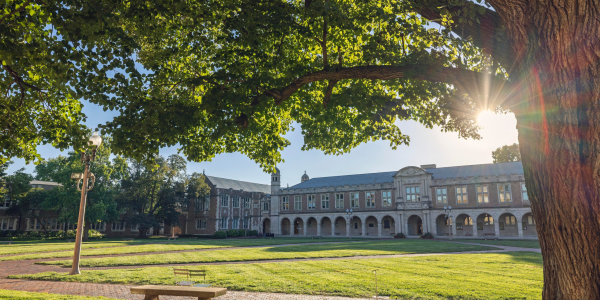All full-time tenured, tenure-track, or teaching-track faculty in Arts & Sciences are eligible to apply for the pilot program, now in its third year.
Effective. Challenging. Creative. These are some of the words students and faculty have used to describe courses offered through Arts & Sciences’ Summer Online Pilot program, which helps faculty create a limited number of seminar-style courses carefully designed for online teaching and learning.
The College of Arts & Sciences and its Summer Session will soon be accepting course proposals from faculty members interested in joining the pilot program in summer 2026. All full-time tenured, tenure-track, or teaching-track faculty in Arts & Sciences are eligible to apply.
“We really don't have much of a history of non-pandemic online learning in Arts & Sciences,” said Amanda Carey, the Dean’s Fellow for Educational Initiatives and a teaching professor in Spanish.

Carey, a faculty lead for the Summer Online Pilot, said its courses build on lessons learned during COVID-19 but are different than many of the remote offerings in 2020, when the pandemic forced a temporary pivot out of classrooms.
"This pilot creates an opportunity for faculty to build upon that experience and really be creative in terms of how we design high-quality, high-touch online teaching and learning in Arts & Sciences."
The program, entering its third year, provides nine months of support for participating faculty members, helping them design academically rigorous online courses through the learning management system Canvas.
In its first year, Arts & Sciences offered five online pilot classes, expanding to seven in 2025. Based on high demand from students and faculty, pilot program leaders said they hope the course selection continues to grow.
Faculty members who have participated in the pilot said they received robust course development support and had positive experiences with students enrolled in their courses. Four out of the five instructors who participated in the first year went on to teach their courses again the following year.
“I really enjoyed the process, and the online program has a lot of support built into it,” said April Bednarski, a teaching professor and associate director of undergraduate studies in biology. “I can definitely say the course was better designed because of the things we learned, and a lot of the elements of the course translate to my teaching in person as well.”
Courses proposed for the pilot must already have been taught in person, so texts, exam questions, and other basic elements remain largely unchanged. The biggest difference, instructors said, is creating a learning community in an asynchronous classroom environment. A partnership with Olin’s Center for Digital Education provides video production and other support to help faculty reach students in new ways.
“Building a digital community is key, in addition to teaching,” said Lizda Moncada, a lecturer in statistics and data science and math who took advantage of the Olin partnership to create personal videos introducing concepts. “Intentionality was also important. In person, I’m in front of students all the time. In an asynchronous format, I had to have a clear vision of what I wanted to achieve from every interaction through the material I was creating.”
In post-session surveys, many students said they chose the online pilot courses to make progress toward their degrees without incurring St. Louis living expenses over the summer. The flexible format also allows easier participation for students living in other time zones, pursuing internships or research, or caring for family.
But there are also pedagogical reasons an online summer course might be appropriate, said Moncada, who taught a statistics course for the summer 2025 pilot. “Students who don’t consider themselves strong at the subject might appreciate the ability to focus on a single class without pressure from other courses or campus life.
Students also said the workload in their online course was similar to that of in-person classes, and noted that quizzes, peer feedback, lectures, and discussion boards helped make them successful in class. “There were plenty of opportunities for engagement with the instructor, and assignments/exams were intellectually stimulating and challenging,” one student wrote in a feedback survey. “This course proved that taking a class online was by no means a shortcut.”
In its first year, students were allowed to sign up for just one summer pilot course. Now, students can take up to two. Faculty and students typically meet one-on-one for online office hours, learning activities, and assessments.
In addition to compensation for teaching the Summer Session course, faculty members chosen to develop online pilot courses receive supplemental grants due to the time commitment required for pedagogical innovation. They also keep all of the original content they create for use in future classes, online or otherwise.
Bednarski recommended taking part in the pilot. “It was a great way to deepen my understanding of Canvas and to learn more about building an online community,” she said. “And there were a lot of rewards along the way.”
Faculty members can learn more about the Summer Online Pilot Program and its guiding principles online or contact Ashley June Moore, director of summer session and programmatic initiatives. Proposals will be accepted Sept. 15 through Oct. 15.





